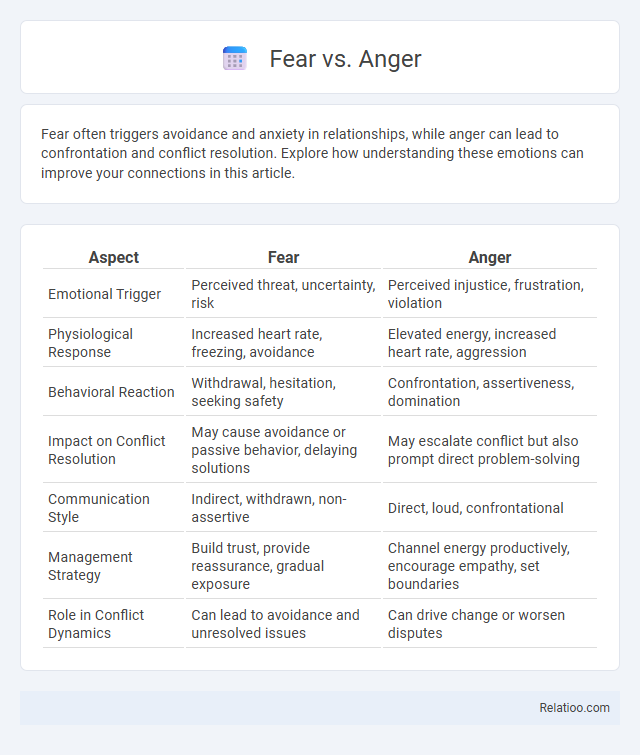Fear often triggers avoidance and anxiety in relationships, while anger can lead to confrontation and conflict resolution. Explore how understanding these emotions can improve your connections in this article.
Table of Comparison
| Aspect | Fear | Anger |
|---|---|---|
| Emotional Trigger | Perceived threat, uncertainty, risk | Perceived injustice, frustration, violation |
| Physiological Response | Increased heart rate, freezing, avoidance | Elevated energy, increased heart rate, aggression |
| Behavioral Reaction | Withdrawal, hesitation, seeking safety | Confrontation, assertiveness, domination |
| Impact on Conflict Resolution | May cause avoidance or passive behavior, delaying solutions | May escalate conflict but also prompt direct problem-solving |
| Communication Style | Indirect, withdrawn, non-assertive | Direct, loud, confrontational |
| Management Strategy | Build trust, provide reassurance, gradual exposure | Channel energy productively, encourage empathy, set boundaries |
| Role in Conflict Dynamics | Can lead to avoidance and unresolved issues | Can drive change or worsen disputes |
Understanding Fear vs Anger: Core Definitions
Fear is an emotional response triggered by perceived threats, signaling danger and activating the body's fight-or-flight mechanism. Anger arises from perceived injustice or frustration, often motivating aggressive or defensive actions. Understanding fear versus anger involves recognizing fear's role in self-preservation and avoidance, while anger drives confrontation and assertion.
Root Causes: Why We Feel Fear and Anger
Fear stems from a perceived threat to your safety or well-being, often triggered by uncertainty or past traumatic experiences. Anger arises when you encounter obstacles that frustrate your goals, or when you perceive injustice or betrayal, activating a fight response. Both emotions share evolutionary roots as survival mechanisms, but fear prompts avoidance, while anger drives confrontation.
Biological Responses: How the Body Reacts
Fear triggers the body's fight-or-flight response through the amygdala, releasing adrenaline and cortisol to prepare for danger by increasing heart rate and blood flow to muscles. Anger activates similar pathways but often stimulates a sustained release of stress hormones, heightening aggression and muscle tension. Both emotions engage the autonomic nervous system, yet fear prioritizes rapid escape, while anger energizes confrontation.
Psychological Impact of Fear Compared to Anger
Fear triggers the body's fight-or-flight response, often leading to heightened alertness and anxiety that can impair decision-making and increase stress levels. Anger, while also activating the sympathetic nervous system, tends to fuel aggressive behavior and impulsivity, sometimes resulting in confrontational outcomes. Understanding the psychological impact of fear compared to anger can help you manage emotional responses more effectively, promoting healthier coping strategies and emotional regulation.
Fear vs Anger in Decision-Making
Fear triggers risk-averse decision-making by heightening perceptions of danger and uncertainty, often leading to avoidance behaviors. Anger, contrastingly, promotes risk-taking and impulsive decisions due to its association with a sense of control and confidence. Understanding the distinct neural pathways and emotional responses involved in fear and anger can improve prediction models in behavioral economics and psychology for more effective decision-making strategies.
Social Expressions: How We Show Fear and Anger
Fear often triggers facial expressions like wide eyes and an open mouth, signaling distress, while anger is marked by furrowed brows and tightened lips, conveying confrontation or displeasure. Your body language during fear may include a defensive posture or retreat, whereas anger often leads to aggressive stances or gestures that assert dominance. Social expressions of these emotions communicate crucial nonverbal cues that influence interpersonal interactions and emotional understanding.
The Role of Fear and Anger in Relationships
Fear in relationships often triggers avoidance and mistrust, hindering open communication and emotional intimacy. Anger, while sometimes destructive, can serve as a signal that boundaries are crossed or needs unmet, prompting necessary conversations for growth. Your ability to recognize and manage both emotions fosters healthier connections and deeper understanding with your partner.
Managing Fear and Anger: Coping Strategies
Managing fear and anger requires understanding their psychological triggers and developing effective coping strategies such as mindfulness, controlled breathing, and cognitive reframing. You can reduce emotional intensity by identifying specific fears or anger sources and practicing relaxation techniques like progressive muscle relaxation or guided visualization. Consistent application of these methods supports emotional regulation and enhances resilience in stressful situations.
When Fear Turns to Anger: The Connection
Fear and anger are closely connected emotions that often influence each other in complex ways. When fear triggers a perception of threat or vulnerability, it can quickly escalate into anger as a defensive response to regain control or assert power. Understanding the neurological and psychological pathways linking amygdala-driven fear to the activation of anger circuits highlights the survival mechanism underlying this transformation.
Overcoming Fear and Anger for Emotional Wellbeing
Overcoming fear and anger is crucial for emotional wellbeing as these intense emotions often trigger stress responses that hinder mental clarity and resilience. You can cultivate emotional balance by practicing mindfulness techniques, which help regulate your reactions and build self-awareness to address underlying anxieties or frustrations. Developing coping strategies like deep breathing and cognitive reframing empowers you to transform fear and anger into constructive energy, fostering lasting psychological health.

Infographic: Fear vs Anger
 relatioo.com
relatioo.com